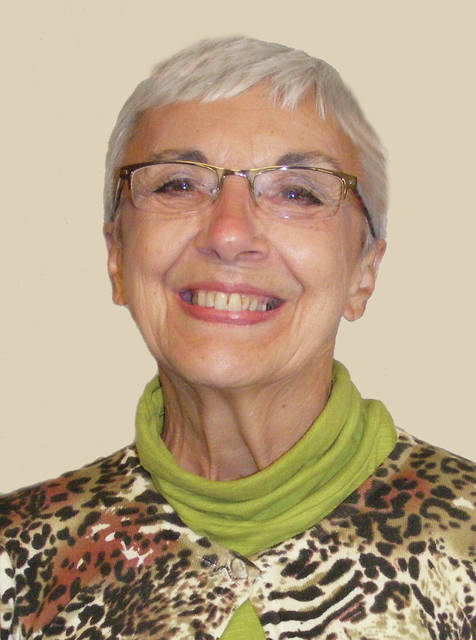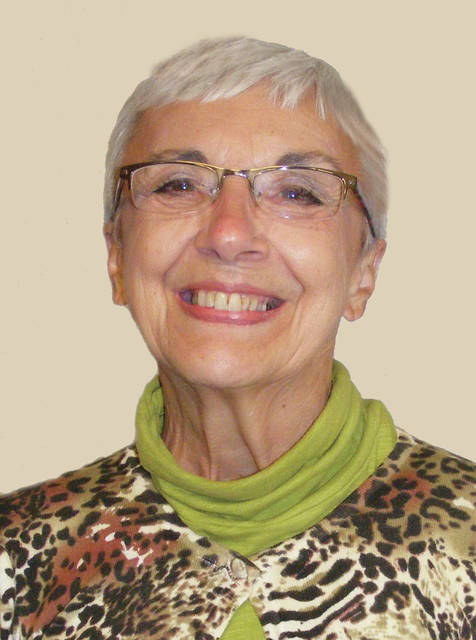
From The Lion King’s “Circle of Life” to Pharrell Williams’ “Happy,” vocal band Six Appeal led local junior high students on a truly magical tour of vocal music through the ages during their recent Arts In Education performances presented by Darke County Center for the Arts at Henry St. Clair Memorial Hall. From the moment the a cappella sextet appeared on stage until the houselights came up following the hour-long session, students were captivated not only by the amazing sounds emanating from the singers, but also by the fascinating lessons being spun by the energetically appealing and talented musicians. Following the awesome opening number that incorporated most of the amazing sounds heard when the Disney musical is staged in theaters, high tenor Jordan, baritone Trey, tenor Michael, baritone Nathan, bass Reuben, and percussionist Berko introduced themselves to their audience, then launched into an exploration of how vocal music has evolved.
Although most of the youngsters already knew that a cappella means singing without accompaniment, they were not aware that the Italian phrase literally translates to “in the style of the chapel.” During low-tech Medieval times when the voice was the best available tool for making music, Gregorian chants featuring a melody line and “a lot of background sounds that didn’t really matter” reflected society in that powerful kings (who mattered) ruled over powerless groups of people (who didn’t). The Renaissance not only brought enlightenment and equality, but also polyphony where many layered sounds of equal importance made vocal music richer and much more interesting for listeners.
As society continued to evolve, musical instruments providing a variety of pleasing sounds were developed, leading to a decline in the popularity of a cappella while audiences embraced accompanied singing; however, in the mid-1800’s the rich, lush harmonies of barbershop singing became popular, first appearing in the black tonsorial parlors of South Carolina. These a cappella songs were sung in English, rather than the European languages of earlier times, changing the way Americans looked at music developed in their own country.
Then came jazz with its driving rhythms and complex harmonies, music which inspires listeners to move, to become an active part of the musical experience. In jazz, voices are often used to imitate instruments; the vocal play of scat singing is also an important component. Just as improvisation is essential to instrumental jazz, scat singers improvise any sound that they can create with their mouths, an exercise that eventually led to doo wop, the contemporary a cappella style that feeds directly into the establishment of vocal bands such as Six Appeal.
After dissecting the contribution of each voice to the vocal band mix and comparing the process to layers of pizza—crust, sauce, cheese, and toppings—, Berko was brought forward to demonstrate his expertise as the group’s “captain of rhythm,” utilizing the entire drum set that miraculously lives inside his mouth to keep a steady beat and establish the groove. Then, as with all the previously mentioned vocal incarnations, Six Appeal performed in the style they were explaining; however, this time the style was their own with many moving parts in perfect balance all working together to create a full and beautiful sound.
Berko gave lessons in beatboxing as well, using call and response on variations of the repeated phrase “boots and cats and” to demonstrate how he successfully achieves the seemingly impossible rhythms that not only imitate the work of deejays, but also underlie and drive the group’s music. Six Appeal launched into their final number, the fittingly entitled “Happy,” as the joyously enthralled audience felt the groove, happily clapping and bouncing along to the music, and then erupting into a spontaneous standing ovation.
Through interaction with an outstanding vocal band which has a passion for education as well as performance, these students had not only enjoyed wondrously dynamic music, but also learned a great deal about musical history, all accomplished while they were enjoying a great time. Once again, DCCA’s goal to provide cultural enrichment was met in a memorable manner for all concerned.





